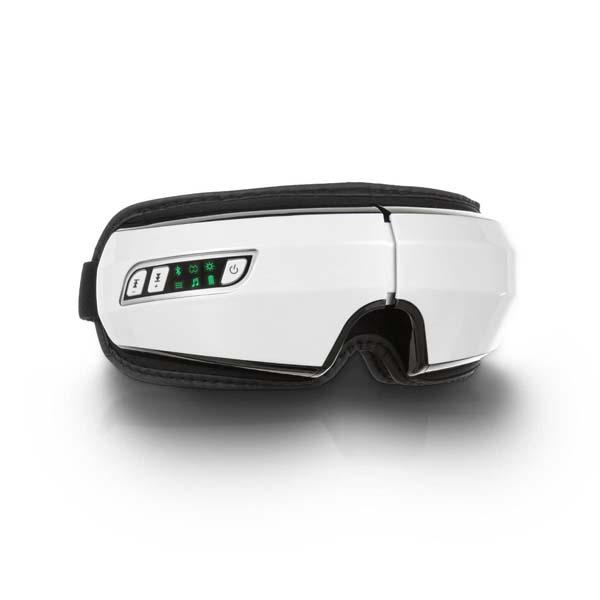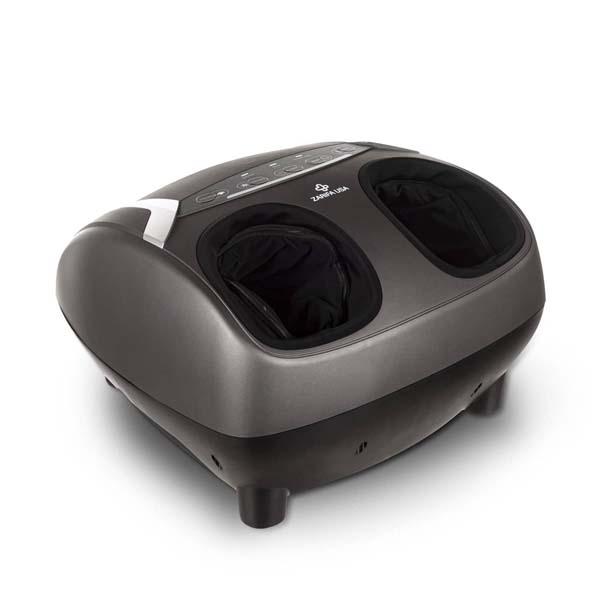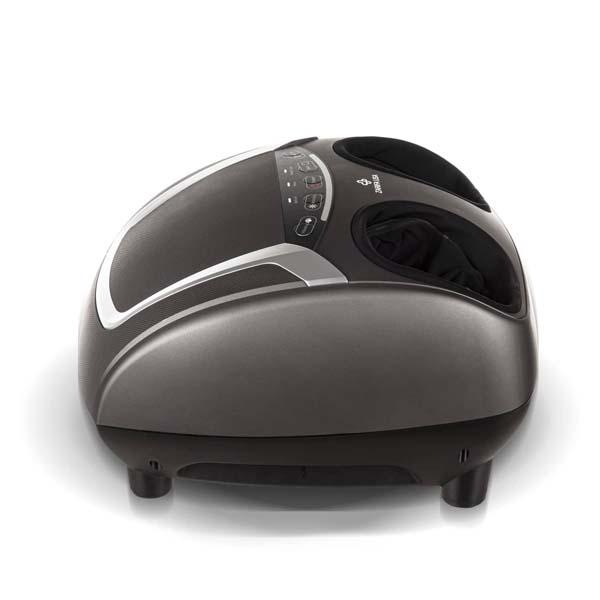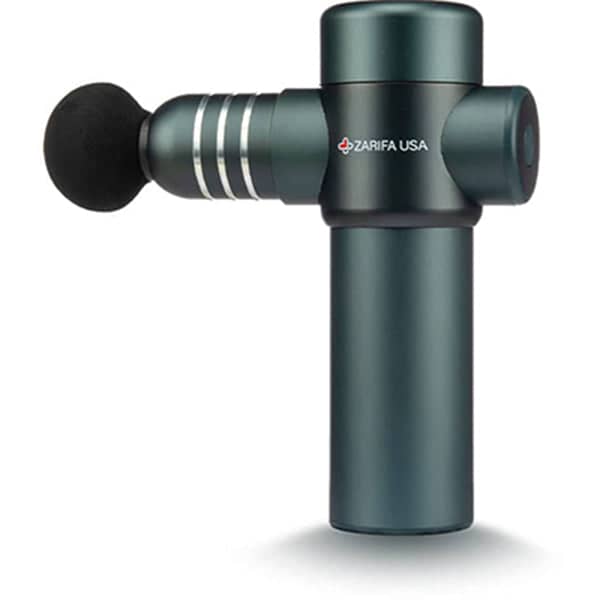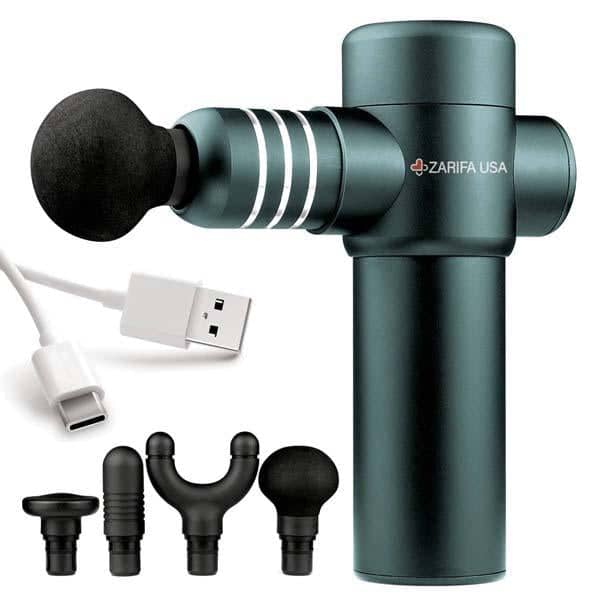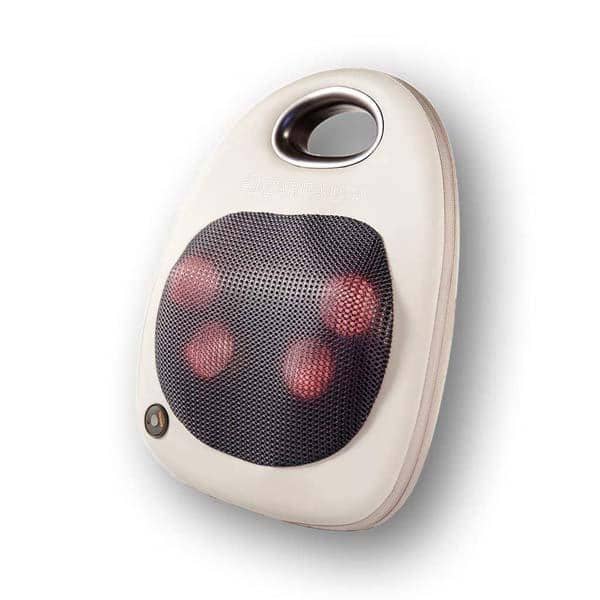Sciatica is a common condition that affects millions of people worldwide. It is usually caused by a combination of factors, including a herniated disc, spinal stenosis, muscle spasms, inflammation, or other spinal abnormalities that cause the sciatic nerve to become compressed.
Symptoms of sciatica include:
- Pain
- Numbness
- Tingling
- Burning sensation in the affected leg
Treatment for sciatica typically involves pain medications, massage therapy, physical therapy, and, in some cases, surgery. When neuropathy is in the feet and hands, foot massagers have been known to be very beneficial, while a quality TENS unit also helps the hands and feet.
Zarifa’s foot massagers help restore strength and flexibility to your feet, relieve stiffness and tension, and improve blood flow and circulation. In addition, the heated massage option is excellent for restoring some feeling to cold toes and warming up your feet after a cold day.
Nerve damage is a broad term for damage to a nerve or group of nerves. Various factors, including trauma, infection, diabetes, toxins, alcohol, chemotherapy, and autoimmune diseases, can cause nerve damage.
- Symptoms of nerve damage include:
- Numbness
- Tingling
- Burning sensation in the affected area
- Weakness or paralysis of the affected area
In severe cases, nerve damage can lead to loss of sensation or even loss of movement. Nerve damage is a serious medical condition that can cause long-term disability or paralysis.
Both sciatica and nerve damage can cause severe pain and disability, requiring treatment. Therefore, it’s essential to consult a medical professional if you suspect that you may have nerve damage or sciatica in order to determine the best course of action.
With sciatica, there is usually more pain when sitting, and can flare up in the morning with potential changes as you move around. However, the pain is more consistent and potentially more sensitive to touch, like from socks and shoes touching your feet with neuropathy or nerve damage.
Note this article is intended for entertainment purposes only. Always consult a physician or medical professional before implementing any medicinal practices, adding medications, and if you have questions about medication interactions with massage.
What are the signs of nerve damage due to sciatica?
Signs of nerve damage due to sciatica may include but are not limited to:
Weakness when bending the knee
- Difficulty bending the foot inward or down
- Difficulty walking on your toes
- Difficulty bending forward or backward
- Abnormal or weak reflexes
- Loss of sensation or numbness
- Pain when lifting the leg straight up when you’re lying on the exam table
Let’s go a little deeper with some examples and more description of what the symptoms might look like:
Weakness in the leg muscles can be a sign of nerve damage due to sciatica. If a person has difficulty straightening the knee when standing, this could indicate sciatic nerve compression, which causes difficulty bending the foot inward or downward, as well as difficulty walking on the toes.
In addition, sciatic nerve compression can cause difficulty bending the body forward or backward. This can be caused by a herniated disc or other spinal abnormality that puts pressure on the sciatic nerve. Abnormal reflexes can also be a sign of nerve damage due to sciatica. If a reflex test indicates that reflexes are weaker than usual, this can indicate nerve damage.
Numbness or loss of sensation can also be a sign of nerve damage due to sciatica. For example, if a person experiences a feeling of numbness or tingling in the leg or foot, this can be a sign of sciatic nerve compression. In addition, pain when lifting the leg straight up when lying on the exam table can also be a sign of nerve damage due to sciatica.
Other symptoms of nerve damage due to sciatica can include muscle spasms or cramping, loss of bowel or bladder control, and weakness in the leg, foot, or toes. If these symptoms are present, seeking medical attention as soon as possible is vital.
In order to diagnose sciatic nerve damage, a doctor may perform a physical exam, order imaging tests such as an MRI or CT scan, or perform a nerve conduction study. Treatment for sciatica can include medications such as anti-inflammatories, muscle relaxants, and pain relievers. Physical therapy, chiropractic treatment, and acupuncture are potential sciatica treatments. Surgery may sometimes be necessary to relieve the pressure on the sciatic nerve.
Early diagnosis and treatment are critical for nerve damage due to sciatica. If you experience any of the above symptoms, seeking medical attention as soon as possible is imperative. With the proper treatment, it is possible to reduce pain and improve quality of life.
How do you fix sciatic neuropathy?
Sciatica treatment includes pain relief medicines such as paracetamol, anti-inflammatory drugs such as ibuprofen, and physiotherapy. Most people with sciatica get better with conservative treatments such as physiotherapy.
But what if you are sick and tired of using pain medication just to do daily functions?
One of the most effective ways to fix sciatic neuropathy is to use stretching and strengthening exercises. Stretching exercises can help to ease tension in the muscles that may be causing or contributing to the pain. Strengthening exercises can also help to support the lower back and improve stability, which can help to prevent further episodes of pain.
In addition to exercises, other treatments such as chiropractic care, acupuncture, and massage therapy can be used to treat sciatic neuropathy. Chiropractic care can help to realign the spine and reduce pressure on the sciatic nerve, while acupuncture can help to reduce inflammation and improve circulation. And as already discussed, massage therapy loosens tight muscles and reduces stress, which can help to reduce pain.
Sciatica neuropathy treatment
Overall, treatment for sciatic neuropathy depends on the underlying cause and the extent of nerve damage. A combination of medications, physical therapy, nerve injections, and surgery can be used to help reduce pain and improve function. Speaking to your doctor to determine the best treatment options for your condition is essential.
In cases where medications and physical therapy are ineffective, nerve injections or surgery may be recommended. Nerve injections can help reduce inflammation and pain in the affected area. Surgery may be recommended in cases of severe nerve damage or a herniated disc pressing on the sciatic nerve.
Does massage therapy help chemo induced neuropathy?
Unless you have had cancer, know someone who has, or you work in oncology, chances are you won’t know what it is, as there is little information out there regarding chemotherapy-induced peripheral neuropathy (CIPN). Short-and long-term toxicity of platinum compounds and taxanes (chemicals in chemotherapy) include the “recipe” for the development of CIPN, for which there are limited options for symptomatic relief.
Although anti-neuropathic medications are available, there is increased interest from healthcare providers and patients in complementary approaches for symptom control, such as oncology massage therapy.
Patients with chemotherapy-induced peripheral neuropathy (CIPN) experience a sustained reduction in lower extremity pain up to six weeks after completing massage treatment when they receive an intensive therapy schedule of three massages per week.
Massage treatments that assist with neuropathy symptoms in the comfort of your home have significantly assisted sufferers. Zarifa’s Foot Massagers work by gently kneading, compressing, rolling, and caressing your feet, muscles, and joints like real massage hands. Our FSA and HSA foot massagers are portable, sleek, and elegant solutions to foot pain relief and overall health and wellness plans.
From ergonomic design, precision point rollers to gentle massage air techniques, the Zarifa Foot Massagers packs a punch in the medical massage category. Contact us today with any questions you may have about our foot massagers or how to determine Flexible Spending Account or Health Savings Account eligibility and reimbursement.
Massage therapies help soothe sore and inflamed joints and muscles in ways that medication often cannot. In addition, peripheral neuropathy patients have reported lessened stress levels and better sleep when staying on a continuous massage schedule.
Massage therapies are the most popular secondary therapies used by Americans (9%, as reported by the NCCAM). Research suggests that massage affects your internal body balance by promoting beneficial blood pressure, heart rate, hormones, and other vital and immune system signals.
“Regular massage of muscles and joints, whether by a licensed therapist at a spa or by self-massage at home, can lead to a significant reduction in pain,” stated Tiffany Field, Ph.D., and Director of the Touch Research Institute. Throughout her studies, Field found that simple massage therapy led to pain improvement, reduced joint stiffness, reduced joint inflammation, and overall heightened joint performance.
A decrease in the stress hormone cortisol, a boost of serotonin production, and general mood improvement are just a few of the results of massage therapy in neuropathy patients. In addition, seeing as a large percentage of pain is emotional, and the stress hormone cortisol is reduced, pain levels in these patients were lowered.
What aggravates neuropathy?
Nutritional or vitamin imbalances, alcoholism, and exposure to toxins can damage nerves and cause neuropathy. Vitamin B12 deficiency and excess vitamin B6 are the best-known vitamin-related causes. Below is a more detailed list:
Diabetes is one of the leading causes of neuropathy. High blood sugar damages the nerves, leading to neuropathy in the hands, feet, arms, and legs. Diabetes can also cause autonomic neuropathy, which affects the nerves that control the heart and blood vessels.
Drinking large amounts of alcohol will damage nerve cells, eventually leading to neuropathy. Alcoholism can cause both peripheral and autonomic neuropathy, leading to numbness, pain, and loss of coordination.
Autoimmune diseases, such as rheumatoid arthritis, lupus, and multiple sclerosis, can affect the nerves and cause neuropathy. In these diseases, the immune system mistakenly attacks the nerve cells, leading to nerve damage.
Exposure to certain toxins, such as lead or solvents, can damage the nerves and cause neuropathy. In addition, certain medications, including some chemotherapy drugs or opiates, can also damage the nerves and cause neuropathy.
Nutritional deficiencies, a lack of specific vitamins and minerals, such as vitamin B12, can cause nerve damage and lead to neuropathy. Vitamin B12 is essential for nerve health, and a deficiency can lead to symptoms such as numbness, tingling, and pain.
Trauma to the nerves, such as an injury from a car accident or fall, can lead to neuropathy. In addition, surgery involving cutting or moving a nerve can also cause neuropathy.
Some infections, such as HIV and Lyme disease, can damage the nerves and cause neuropathy. Sometimes, the infection can be treated, and the neuropathy reversed.
Certain hereditary conditions, such as Charcot-Marie-Tooth disease, can cause neuropathy. In addition, genetic mutations cause these conditions and can lead to symptoms such as tingling, numbness, and weakness.
Pressure on the nerves due to a tumor, cyst, or herniated disk can cause neuropathy. Sometimes, the pressure can be relieved surgically, and the neuropathy reversed.
Certain medical conditions, such as kidney failure and hypothyroidism, can cause nerve damage and lead to neuropathy. In these cases, treating the underlying condition can help improve neuropathy symptoms.
What’s the best home remedy for neuropathy?
While there isn’t a magic cure-all solution for neuropathy, these home remedies may help to alleviate symptoms and reduce pain. However, speaking to your doctor before beginning any new treatments is imperative to ensure they are safe and appropriate for your situation.
Vitamins: Vitamins are essential for nerve health. A supplement containing vitamins B12, B6, and folate can help improve nerve function and reduce neuropathy symptoms.
Cayenne Pepper: Cayenne pepper contains capsaicin, an ingredient that can help reduce pain. Applying a cream containing capsaicin to the affected area can help reduce pain and improve nerve function.
Quit Smoking: Smoking is a significant risk factor for nerve damage and neuropathy. Quitting smoking can help reduce the risk of nerve damage and improve nerve function.
Warm Bath: A warm bath can help reduce pain and improve nerve function. The warm water can relax the muscles and reduce inflammation, improving nerve health.
Exercise: Exercise can help improve nerve health and reduce neuropathy symptoms. Gentle stretching and strengthening exercises can help improve flexibility and increase circulation, which can help reduce pain.
Essential Oils: Essential oils, such as lavender and eucalyptus, can help reduce pain and improve nerve function. Applying a few drops of oil to the affected area can help reduce inflammation and improve nerve health.
Meditation: Meditation can help reduce stress and improve nerve health. Practicing meditation can help reduce pain and improve sleep, which can help improve nerve function.
Acupuncture: Acupuncture is a traditional Chinese medicine practice that involves inserting thin needles into the skin. This can help reduce pain and improve nerve function by stimulating the body’s natural healing processes.
Managing Diabetes: Maintaining reasonable blood sugar control is essential for preventing and treating neuropathy in people with diabetes. Regular blood glucose monitoring, medication, and lifestyle changes can help manage blood sugar levels and prevent nerve damage.
Avoiding Alcohol: Limiting or avoiding alcohol consumption can help prevent neuropathy. Cutting back on drinking can also help improve symptoms in people with neuropathy.
Treating Autoimmune Diseases: Treating the underlying autoimmune condition can help prevent or reduce neuropathy. In addition, medications can sometimes help control the immune system and reduce nerve damage.
Avoiding Toxins and Medications: Limiting exposure to toxins and avoiding medications that can damage the nerves can help prevent neuropathy. For example, people who must take chemotherapy drugs should discuss the risks and benefits with their doctor.
Eating a Balanced Diet: Eating a balanced diet that includes all essential vitamins and minerals can help prevent neuropathy. For example, eating foods high in vitamin B12, such as eggs, beef, and dairy products, is especially important for nerve health.
Protecting the Nerves: Protecting the nerves from trauma and pressure can help prevent neuropathy. Wearing protective gear when engaging in sports or activities that could cause injury can help reduce the risk of nerve damage.
Treating Infections: Promptly treating infections can help prevent nerve damage and neuropathy. In some cases, medications or surgery can treat the infection and reduce the risk of nerve damage.
Managing Hereditary Conditions: For people with hereditary conditions that can cause neuropathy, regular monitoring and follow-up care can help prevent or reduce nerve damage. In some cases, medications can help reduce symptoms and improve nerve function.
Physical Therapy: Physical therapy can help reduce pain and improve function in people with neuropathy. Exercises focusing on stretching and strengthening the muscles can help reduce pain and improve coordination.
Medications: Certain medications, such as antidepressants and antiseizure drugs, can help reduce neuropathy symptoms. In some cases, injecting vitamins or medications directly into the affected area can also help reduce pain and improve nerve function.
Is it sciatica or nerve damage?
Although nerve and sciatica pain can be uncomfortable, many home remedies can help relieve the symptoms. From vitamins to warm baths, these treatments can help reduce pain and improve nerve function.
Please remember this article is intended for entertainment purposes only. Always consult a physician or medical professional before implementing any medicinal practices, adding medications, and if you have questions about medication interactions with massage.




